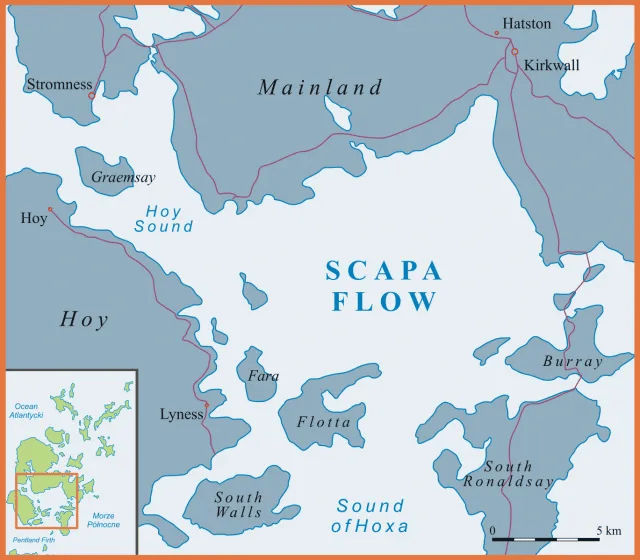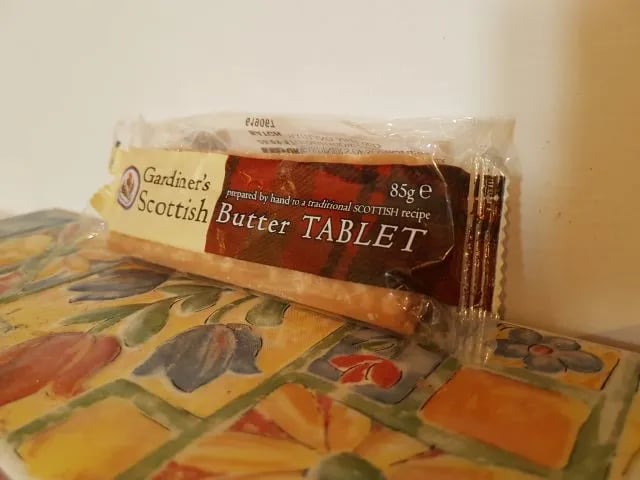In which building a protagonist is like fortifying Orkney for World War II
One of my pet peeves is when readers of a book critique the protagonist’s ability to solve whatever problems the plot presents. Obviously there is a whole side discussion to have about gender here, as female and non-cis protagonists are critiqued more heavily in this regard, but for our purposes today, I am going to try to keep this as simple as possible: of course the protagonist is oddly suited to solve plot problems. That’s why they’re the protagonist. It’s the single thing that every book holds in common. We are asked, as readers, to accept that this person is, for the next little while, the centre of everything that has ever happened in this universe.
The Orkney Islands are north of Scotland by about ten miles. The channel between has incredibly strong tides, and therefore navigation is treacherous both above and below the water. The temperature is about 7°C in the winter and 15°C in the summer. There are about 70 islands, 20 of which are inhabited, and the biggest one is called The Mainland, because it’s more or less the centre of Orkney’s universe. Originally taken by the Norse in 875CE, they came under Scottish rule in 1472 after King James III didn’t receive a cash dowry for marrying Margaret of Denmark (the King of Norway was hard up for funds). Since no one ever got around to changing the contract, if Denmark ever pays up, the islands will go back to Norway’s rule, because literally nothing in Europe is ever straightforward.
ANYWAY. So here we have these sparsely populated Scottish islands that follow Viking land-use laws (this mostly applies to fishing because not many people carry long ships across fields anymore, but was enough to save the cathedral in Kirkwall from Oliver Cromwell), and they became tremendously important.
One of the criticisms I get most often for The Story of Owen is that Siobhan’s skillset is too coincidentally useful to the plot. How lucky for Owen Thorskard that the first person he meets in Trondheim is a bard. How lucky that he tells his aunts. How lucky that Lottie and Hannah immediately become aware of the possibility that forging a relationship with Siobhan presents. Which is a weird thing to say, I think, because without Siobhan’s particular skillset there is no plot. That’s why Katniss Everdeen is an archer. It’s why Harry Potter has a scar on his forehead. It’s how the story starts, and the universe begins to grow.
You might be wondering why the Orkney Islands, hovering around the 59th line of latitude, became so central in the scheme of the British navy, and the answer, it turns out, is pretty simple. London isn’t a good place to put anything, because it’s been crowded and weird for millennia, and also England has been at war with France for most of its history, which makes The Channel a vastly impractical place to put anything you want to keep a secret. Enter Orkney, specifically, a great big bay called Scapa Flow. Scapa Flow was excellent because it was a natural harbour and it was huge and it was nowhere near France. The Hudson’s Bay Company was based there, and by the time WWI rolled around, the British were just accustomed to using it. There was just one tiny problem: the harbour had several access points.
So. Your protagonist. You have lovingly crafted them to be the perfect (or perfectly imperfect) method by which to deliver your story. And then someone says “That’s too easy” or “That’s too many coincidences” or “You’ve written a Mary Sue”. My advice in this case is to take a deep breath, avoid punching that person in the neck, and then double the eff down on whatever made your protagonist “too unique” in the first place.
To protect the multitude of entries into Scapa Flow, the UK navy sunk old ships to block up all the channels they didn’t want to be passable. This worked fine in WWI, but by the time WWII rolled around, those strong tides I mentioned earlier had pulled several of the scuttled ships out of place, and a German U-boat actually got through, destroying the Royal Oak—the only ship in the bay that night—and then escaping back to German waters. A chap by the name of Winston Churchill came up to take a look at the islands, and decided to replace the underwater sunken ship barriers with something more permanent. If you look back up at the map, those red lines are roads, and the bits where they go over water? Those are the Churchill barriers, built by Italian POWs in the early 40s (as causeways, so that people on South Ronaldsay could go to Kirkwall to see the pictures, because POWs aren’t allowed to build fortifications under the Geneva Conventions). By the time the engineers were done, Scapa Flow was even more perfect a base than it had already been.
The other thing to keep in mind is that your world and the events that your protagonist encounters are allowed to make them better…and it doesn’t have to be on page. Rey can fly a ship because she repaired a flight simulator for kicks because she had nothing else to do. She can speak Shyriiwook because she’s spent time eavesdropping on Wookiees who came to Jakku. She knows a lot about the various other people who share her planet, and almost none of that is told to us on screen because the movie had other things to get done. It’s not bad storytelling because you have to do some of the work yourself. (Though I do recommend reading Rey’s Survival Guide, wherein the specs of an X-wing will make you cry.)
When the Royal Navy decided to send all these ships up to Orkney, they also sent a tonne of sailors and support staff. Since the whole of the UK was operating under extreme austerity at the time, in terms of resource management, it was up to the Orkney farmers, who had mostly been at subsistence level until this point, to feed everybody. The government essentially said “Hi, we need you to feed several thousand random strangers, is that okay? We will give you shiny new tractors”, and the Orkney farmers, who were still mostly farming with teams of oxen were all over it. More than 60 years later, Orkney is thriving thanks to their ability to feed their own sheep, fish their own waters, and brag about everything they’ve done to the tourists who come to see them.
And that’s the cycle of how your main character—too perfect or whatever—becomes absolutely necessary: you make them good at a thing, you make the plot revolve around the thing, you make the universe revolve around the thing. More specifically: you make Katniss an archer, you have hunting be the tiny spark of her rebellion, you put a bow in her hands and set her up across from President Coin. Don’t just build a character who can change the world. Build one who can stand, for however brief a time, at its very centre.
+++
This week in Product Reviews No One Asked For: Scottish Tablet.
So tablet is weird because it’s not entirely unlike fudge? Like, fudge usually comes in flavours, and if I was describing tablet, it would be “blank fudge”, but the consistency is all wrong, so it’s not very fudge at all.
I like it a lot, though. Like much of Scotland, it makes zero sense but works really well for some reason. :)

